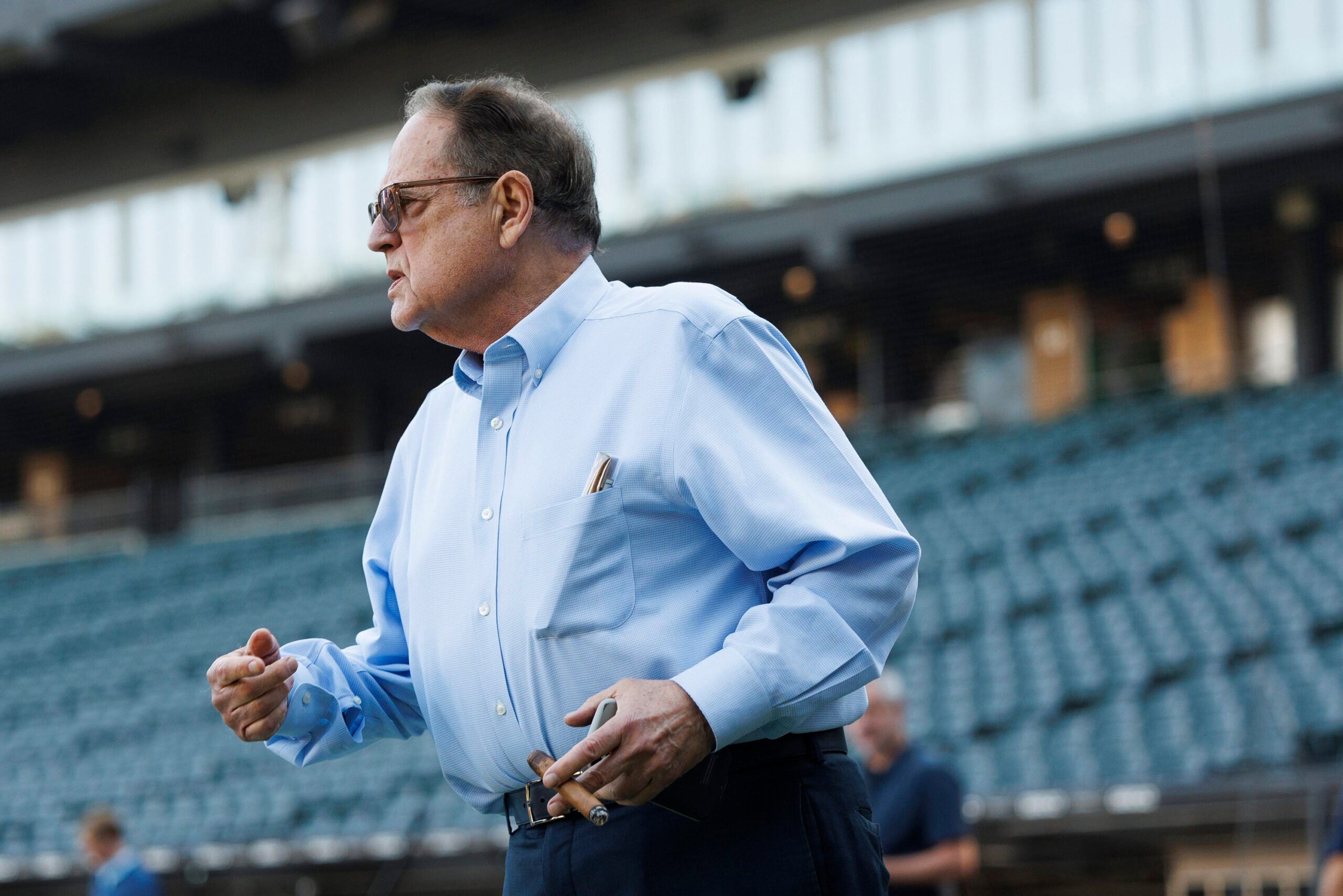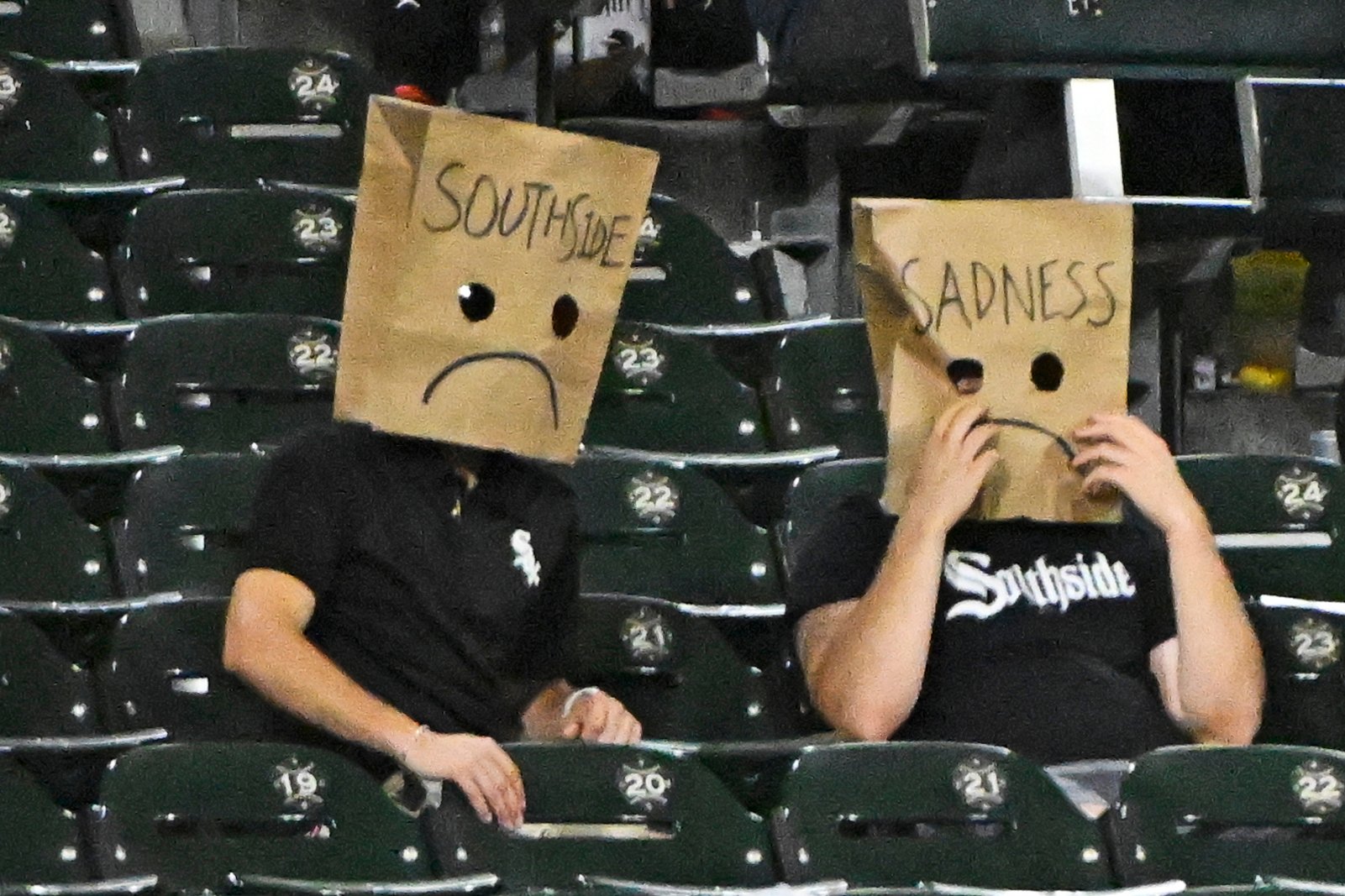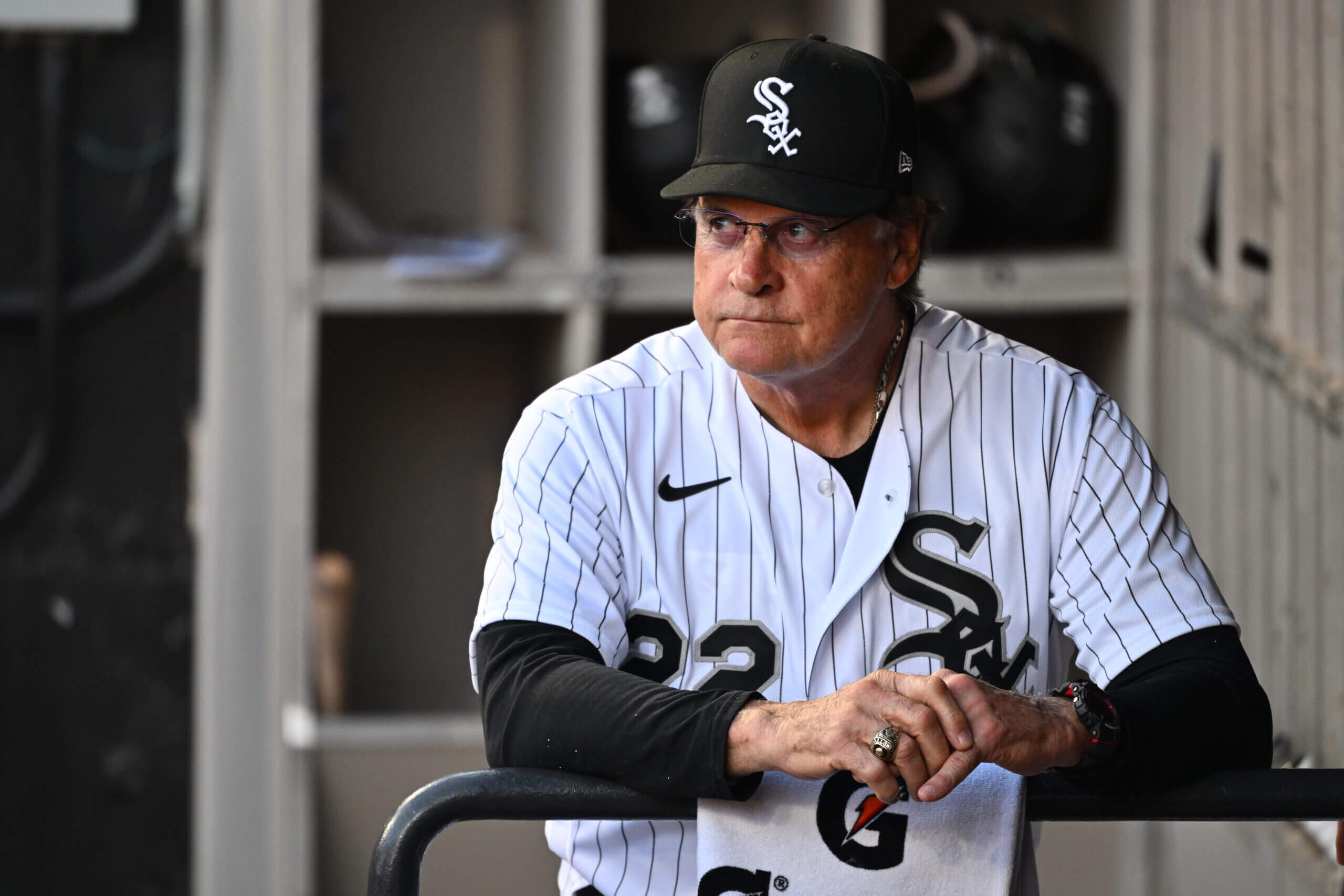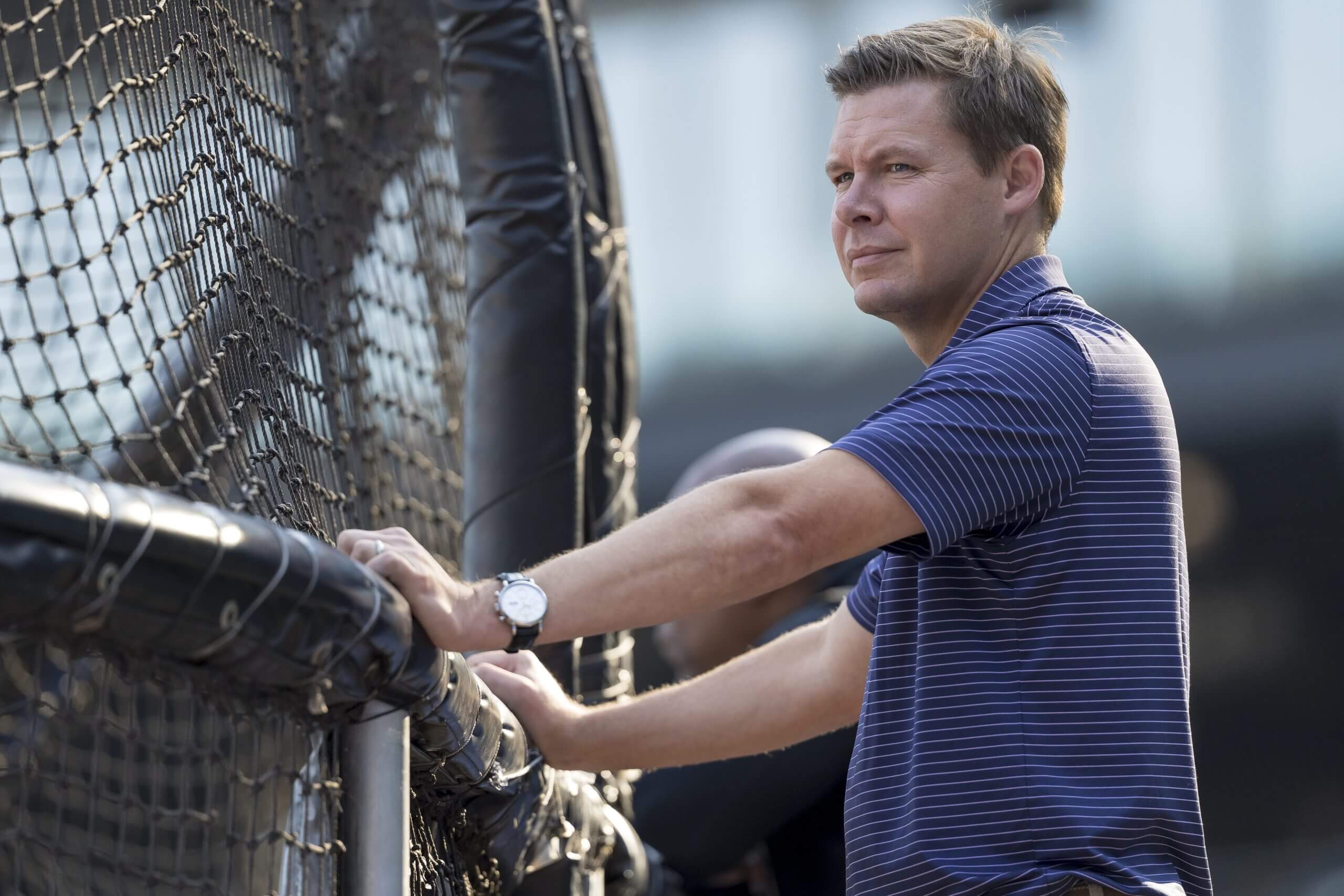
A team doesn’t lose 117 games and counting because of just one thing. In the case of the 2024 Chicago White Sox a meddling owner, dubious leadership, injuries and an inability to properly value and integrate analytics only begin to tell the story.
The White Sox would need to win seven of their last nine games to avoid tying the 1962 Mets’ 120 losses for the worst record in modern baseball history. They are the first team since 1900 to have three separate losing streaks of 12 or more games. Opponents have outscored them by more than 300 runs. Few expected the South Siders, who lost 101 games last year, to contend. But no one predicted this level of incompetence.
And yet for all the factors that led to this season’s disaster, when players and traveling staff try to encapsulate how things reached such a sorry state, again and again they bring up one thing: the plane.
The White Sox charter an Airbus320, a plane first manufactured in the 1980s. It features only eight first-class seats; the rest is coach. A majority of MLB teams charter bigger 757s, with ample first-class seating for the players and the coaching staff. Even well-known frugal franchises such as the Tampa Bay Rays, Colorado Rockies and Miami Marlins charter nicer planes. But not the White Sox.
When a player new to Chicago first stepped onboard this season, he said loudly: “C’mon, man, no show plane?” A chorus of players burst into laughter. Last year, a tweet comparing the planes used by MLB teams caused a stir when it was shared among White Sox players while they were onboard.
A team plane doesn’t make errors or poor baseball decisions. But the White Sox’s decision to use a smaller, older plane reflects how they operate. The difference between the White Sox and other clubs is so stark, players who leave Chicago for other teams celebrate their freedom by texting each other “This is the big leagues.”
“They don’t do the little or the big things right,” said a recently departed veteran.
The Athletic spoke to nearly 40 current and former White Sox employees and others in baseball about the larger issues plaguing the dysfunctional franchise, which is run according to the whims of owner Jerry Reinsdorf. The 88-year-old Reinsdorf led a group of investors who bought the team for $19 million in 1981. (He also owns the Chicago Bulls.) They won the World Series in 2005, but have made only three playoff appearances since, losing all three series.
Many of those who spoke to The Athletic, some of whom requested anonymity to speak candidly about Reinsdorf and the state of the franchise, said that the owner’s views on the game have calcified. That while at times Reinsdorf has carried a big major-league payroll, he has refused to invest in the cutting-edge amenities and infrastructure needed to succeed.
Some of Chicago’s wounds were self-inflicted and immediate, such as hiring Tony La Russa to manage. Others festered for years, such as the team’s reluctance to adapt to analytics, and a leadership structure that led to division. All can be traced back to Reinsdorf, who last season ignored pleas by others in the organization to interview outside general manager candidates and promoted internally instead. Reinsdorf even let popular broadcaster Jason Benetti leave because he didn’t like his style.
“You got a baseball fan owner who thinks he knows everything, and maybe he did in 1992,” said a former employee, “but the amount of info has skyrocketed in the last 30 years and he’s put his middle finger up at that.”
“As long as Jerry’s philosophy is the overarching one,” another former employee added, “they won’t ever succeed.”

Owner Jerry Reinsdorf, smoking a cigar before a game last season, is involved in almost every aspect of the White Sox organization. (Armando L. Sanchez / Chicago Tribune / Tribune News Service via Getty Images)
In a recent season, while addressing new employees, Reinsdorf was asked which matters more: the Bulls or White Sox winning? Rather than answer diplomatically, Reinsdorf, without hesitation, said the White Sox.
A baseball-obsessed Brooklyn native, he fills his office with autographs and sports memorabilia and loves chatting with scouts, talking about the game and its history. Reinsdorf will proudly tell you he went to Jackie Robinson’s first game in a Dodgers uniform, and he values his friendships with Hall of Famers such as La Russa, Dennis Eckersley and George Brett.
But Reinsdorf’s affection for baseball is also an affection for how the game used to be played. Sources describe him as stubborn and generally unwilling to adapt to an era where his preferred style of play — “get ’em over and get ’em in”— is no longer the sole recipe for success.
“I’m not sure if any owner loves baseball as much as Jerry,” said another former employee. “That’s why he can’t get out of his own way.”
Though he rarely appears on television during broadcasts, Reinsdorf frequently watches games from his suite at Guaranteed Rate Field, which has a door connecting to the baseball operations department.
His influence on the team is everywhere. It’s not unusual for Reinsdorf to text broadcasters in-game about what they’re saying, to attend offseason and spring training meetings (he lives in Arizona) or to solicit advice from his cabinet of handpicked advisors. Last offseason, Reinsdorf let Benetti out of his contract to go to another AL Central team, the Detroit Tigers. Reinsdorf didn’t like Benetti’s personality; he featured analytics, made jokes and wasn’t always effusive toward a losing White Sox team. (Benetti declined to comment, though he made references to feeling disrespected on a podcast with The Athletic.)
“He’s hands-on in every part of the organization,” said former White Sox player and team vice president Kenny Williams of Reinsdorf.
Williams played for the team from 1986-88, then rejoined the franchise in 1992 as a scout. He rose to GM in 2000 and oversaw the construction of the 2005 team, becoming the second Black general manager to win a World Series — the team’s first since 1917 — and cementing his place in Chicago sports lore.
Williams refers to Reinsdorf as a second father and bristles at suggestions that the owner – who Forbes estimates is worth $2.1 billion – only cares about profits.
“He just wanted to break even,” Williams said of Reinsdorf, who reportedly is willing to help finance a new proposed ballpark in the more desirable South Loop location. “I always thought over the years it was a little unfair when people would say, ‘All he cares about is making money.’ I’m sitting in the office and he’s saying, ‘I’m going to give you what I got.’”
The White Sox are run like a family business. Many employees have personal relationships with Reinsdorf, and the team’s job security is arguably the best in baseball. But Reinsdorf can be loyal to a fault.
“They have people there with no business being in Major League Baseball,” said an executive with another team.
The 2005 World Series win was the franchise’s crowning achievement under Reinsdorf, but it also gave the organization a false sense of confidence that kept it from evolving. Reinsdorf and a certain faction of the organization felt no pressure to adapt. The personnel was so insular that multiple former employees described it as a time warp.
One of the Sox’s most glaring failures has been the team’s limited embrace of analytics. Reinsdorf, sources say, would make comments in meetings such as: “You guys know I’m not an analytics person. I’m not big into this.” He questioned at least one White Sox player about whether it was possible to have too much information.
The team didn’t shun the movement entirely. The White Sox were one of the first teams to invest in a spring training pitching lab, purchased iPitch machines for approximately $15,000 each to help train hitters and hired the analytically savvy Ethan Katz as pitching coach in 2020.
“Did we have a large analytics department when I was there? No, we didn’t,” said Williams. “We didn’t have those kind of resources to allocate towards that. But did we (make investments)? Absolutely, and with total support of ownership on that. As long as we proved, or at least made the case, that it could be beneficial for the on-field product.”
But the White Sox’s investment only went so far. To reduce overhead, the team outsourced some number crunching to Zelus Analytics, a private outside firm.
“(They) are good if you have nothing,” one rival executive said. “But the whole point of analytics is to have your own customized models for your players to gain an edge. You don’t get that from an external firm.”
Nor do teams advance when their decision makers are split on data’s value. General manager Chris Getz, like his predecessor, Rick Hahn, advocates for the White Sox to make greater use of analytics. But, like Hahn, Getz never worked for an organization at the forefront of the movement, such as the Houston Astros, Tampa Bay Rays or Los Angeles Dodgers.
Even when they tried to use analytics, the White Sox weren’t sure how. For years, they used two sets of adjusted Trackman data: One, like most teams, they received from a third party, and another was developed by their own analytics people. Sometimes the two sets of data would be dramatically different, making it difficult to evaluate players and write reports. In 2019, a debate about using spin rate versus adjusted spin rate caused internal strife.
“It was comical,” said a former baseball operations employee of different departments using different sets of data. “No one knew what was what.”
In 2024, the White Sox are still untangling the lines of data communication. Several former members of this year’s team pointed to defensive positioning as an area of concern. The White Sox rank near or at the bottom of publicly available defensive metrics, in part, former players say, because their fielders often are in the wrong spots.
“That’s a huge area I felt could be better,” said outfielder Tommy Pham, who signed with the White Sox as a free agent in April and was traded in July. “They know it.”
Former pitchers describe Chicago’s game planning as almost rudimentary. Rather than provide individual plans for each hitter, the White Sox offer generalities such as, “Your sinker will play down in the zone” — an insufficient answer against, say, a lineup full of left-handed hitters who handle sinkers in that area. Minor league pitchers with high walk totals were told things like “work on your command,” with no other specifics, in the offseason.
Hitters expressed similar concerns. “They had information,” one former position player said. “But you didn’t get an explanation or a plan.”
Reinsdorf told The Athletic via email: “Analytics are a very important part of the game, a useful tool that compliments but will never completely replace human judgment.”

White Sox fans express their feelings about a season that is in the running for one of the worst in baseball history. (Matt Marton / Imagn Images)
Before the 2013 season, Reinsdorf promoted Williams to executive vice president, with Hahn — Williams’ longtime right-hand man — becoming general manager. Hahn was seen as a rising star, a Harvard Law School and Northwestern business school graduate who was part of a new wave in front offices. He planned to modernize the organization, in part by better incorporating analytics.
The White Sox finished no better than 17 games out of first place in the first three seasons under Hahn, and announced a shift in philosophy midway through 2016. The club was “mired in mediocrity,” Hahn said, and in need of a rebuild.
But Hahn and Williams had different views on how organizations should be run, and over time, that dynamic impacted the operation of the team, sources say.
“I was known as and called ‘a baseball guy,’” Williams said. “It was like it was an insult, that I could go in and see a guy work out for a day and tell you he was going to be an All-Star.”
Hahn, facing opposition from the old guard, struggled to bring changes to the team’s usage of analytics and technology. He often pushed back against the perception he wasn’t calling the shots, but effectively had to please multiple power brokers, including Williams, Reinsdorf and, later, La Russa.
Hahn declined to comment for this story. Williams said of their dynamic: “We had a great relationship. During the good times, it was better. During the bad times, there was only one other person it seemed like we could laugh with, and that was each other.”
Williams became less of a day-to-day presence as the team rebuilt, sources say, a point Williams disputes. But in a meeting before the 2020 season, as the White Sox were starting to rebound, Williams announced it was time for the team to turn the corner and that he’d be taking a more active role.
“It was like the (Michael Jordan) unretirement. It caught people off guard,” said one person involved in the meeting.
“Rick Hahn was much better suited to take them forward. Kenny was a platinum employee,” said another former baseball operations employee. “He would show up and block certain trades and want to take the No. 1 pick in the draft. … There was a lot of resentment from people inside about that (dynamic).”
The divide manifested further in the polarizing lieutenants each man chose. Williams had his son, Ken Williams Jr., who eventually ascended to assistant farm director. Hahn trusted Jeremy Haber, another Harvard grad. The younger Williams butted heads with many in player development and, despite his inexperience, was quick to offer dissenting views. Haber could be bullish as he advocated for his boss’ point of view and was seen as an aggressive climber. (Both men are no longer in the organization. Williams Jr. declined to comment; Haber did not respond to interview requests.)
Still, for all their issues, the White Sox’s rebuild progressed. The team developed homegrown players such as Tim Anderson and Garrett Crochet, traded for Lucas Giolito, Yoan Moncada, Eloy Jiménez, Dylan Cease and Dane Dunning and agreed to long-term extensions, with Reinsdorf’s approval, for Jiménez, Moncada and Luis Robert Jr.
The White Sox made the playoffs in a shortened 2020 season. Hahn’s peers voted him Sporting News Executive of the Year.
And then Reinsdorf made a hire that helped unravel it all.

La Russa hadn’t managed in a decade when Reinsdorf made the decision to bring him back to the White Sox. (Jamie Sabau / Getty Images)
A.J. Hinch’s suspension from baseball for his role in the Houston Astros sign-stealing scandal ended the minute the 2020 season came to a close. Almost immediately, he was courted by Al Avila, then the Detroit Tigers GM, and Hahn.
On paper, the White Sox job was the better of the two. Coming off its playoff appearance in 2020, Chicago was considered much closer to the World Series than a Tigers team with back-to-back last-place finishes.
Hahn told reporters at the time the White Sox were looking for someone who has “experience with a championship organization in recent years,” which was taken as a thinly veiled reference to Hinch, who guided the Astros to two World Series appearances, including their 2017 win.
Hinch and his wife packed for interviews in both cities. Detroit came first, but Hinch was being advised by friends on places to live in Chicago, sources said. But before Hinch even made it to Chicago, Reinsdorf pulled a stunner: He hired 76-year-old La Russa, who hadn’t managed in a decade.
Thirty five years earlier, Reinsdorf had allowed then-White Sox GM Ken Harrelson to fire La Russa from his first major-league managing job, a decision he later called “the dumbest thing I ever did.”
The email the White Sox sent out to fans announcing La Russa’s hire included an image of Hinch’s signature. The blunder was later chalked up to a graphics glitch, but it was seen inside and outside the organization as further proof that Reinsdorf had passed over Hahn’s choice for his own.
La Russa’s hiring was widely criticized, particularly after it was revealed that he had been charged with driving under the influence — his second such incident — that February. The White Sox lost to the Astros in the first round of the playoffs in 2021, their first season under La Russa. And things fell apart in his second season. Injuries to several players in whom the White Sox had invested heavily were a significant factor, but La Russa made bizarre in-game decisions, acted as a one-man show rather than the head of a collaborative staff, and failed to get the most out of his players. His health also suffered. He dealt with cancer, required a procedure to repair the circuitry of his pacemaker and did not manage the team after Aug 28.
Asked about La Russa’s nearly two seasons as manager, Williams said, “I don’t yet have a way to talk about that period of time because it takes me to a bad place, and it will take me from the person I aspire to be.”
The White Sox hired Pedro Grifol to replace La Russa. Nearly 10 months later, Reinsdorf dismissed Williams and Hahn, making a rare pivot away from employees with long-standing ties to the organization, executives who had led the team to back-to-back postseason appearances for the first time in franchise history before some of their moves backfired.
Grifol was an outside hire; he came from the Royals. People within the organization advocated for Reinsdorf to go outside for his new GM as well. He ignored those appeals and instead promoted Getz, a former White Sox player, just nine days after Hahn and Williams were dismissed, without interviewing a single external candidate. The decision required the Sox to work with MLB on a backfill plan to satisfy the Selig Rule, which is aimed at diversifying front office candidates. Reinsdorf said at the time that he selected Getz because he knew the White Sox organization intimately and “we want to get better as fast as we possibly can.”
Under Getz, who spent two years with Kansas City before he rejoined Chicago as farm director in 2017, the White Sox player development system wasn’t exactly thriving. There were off-field issues as well. Former Double-A manager Omar Vizquel did not return in 2020 after a former batboy who has autism accused him of sexual harassment (the batboy in 2022 dropped claims against the White Sox and reached a confidential settlement with Vizquel). And Triple-A manager Wes Helms was placed on an indefinite leave of absence in May 2022, with no reason given for his exit.
Why not at least interview people from other organizations, even just to learn how other teams operate?
“Jerry just thinks he has the answers,” said a former staffer.
The White Sox are now on their fourth manager in five seasons (or their fifth counting Miguel Cairo, who managed while La Russa dealt with his health issues). Grifol – bilingual like La Russa, but 25 years younger – seemingly had a better chance to connect with the team’s young players. But former reliever Keynan Middleton said last season that problems under La Russa continued under Grifol, with players skipping meetings and refusing to participate in drills. Grifol this season frustrated his players on several fronts, calling them “f—ing flat” after a loss to the Baltimore Orioles on May 26, instituting mandatory pregame workouts before night games after the All-Star break and at times employing questionable strategy.
Grifol, speaking publicly for the first time since his dismissal, said the required workouts and his strategic decisions were efforts to help the team improve. Regarding the extra work, he said, “This was (on) all of us, myself included — I’m the manager. Our work ethic has to be spot on during that type of storm.”
Some players and staff sympathized with Grifol, given the team’s poor talent level and lack of quality analytics.
“What manager could have made things better?” Pham asked.
Getz replaced Grifol on Aug. 8 with interim manager Grady Sizemore, and said the White Sox would conduct a search outside the organization for a permanent replacement. He vows to get the new hire better analytical support.
“When I was hired and given the position of farm director, my goal was, let me show everyone the positive impact analytics and technology can have (in the minors),” Getz said. “We had a lot of wins along the way … My intention from the beginning was to modernize. We are going to modernize.”

The White Sox promoted Chris Getz to general manager without interviewing a single external candidate, against the advice of some in the organization. (Matt Dirksen / Getty Images)
Reinsdorf promoted Getz with talk of him orchestrating a rapid turnaround. But some of the new GM’s early moves puzzled rival executives.
Getz’s trade of reliever Aaron Bummer to the Atlanta Braves last November brought back five players, but the group included some to whom the Braves were unlikely to offer contracts. In the ensuing roster congestion, the White Sox waived two players who are now useful major leaguers elsewhere: Boston Red Sox infielder Romy González and Miami Marlins reliever Declan Cronin. Getz also traded Jake Cousins for cash and released Tim Hill — effectively getting nothing for two relievers now contributing for the New York Yankees.
It’s too soon to know whether Getz’s four-player return from the San Diego Padres for ace Dylan Cease was adequate, and whether he made the correct call holding pitcher Garrett Crochet at the trade deadline despite receiving attractive offers. The GM’s big move at the deadline, a three-team deal in which he parted with three in-demand players in right-hander Erick Fedde, reliever Michael Kopech and Pham, netted an unproven hitter, Miguel Vargas, and two prospects who, according to MLB.com, are not part of the White Sox’s current top 10.
Making matters worse: Because of MLB’s new anti-tanking measures, Chicago could set a new record for baseball losses and still pick 10th in next year’s draft.
“No one can project a timeline to winning,” Reinsdorf told The Athletic, “but there are many examples of organizations, some very recently like Kansas City and Baltimore, that have rebounded very quickly.”
The Royals, who averaged 100 losses over five full seasons, and Orioles, who averaged 105 over four, did not rebound that quickly. But as the White Sox talk about moving forward, they are in some ways becoming less insular.
This season the franchise added a dedicated coach at each minor-league affiliate to help with analytics. Getz, sources said, tried to push that through several years ago and met with resistance. Getz also brought in notable outsiders in Brian Bannister, Josh Barfield and Jin Wong to the front office, and a committee evaluating all facets of the organization recently presented its findings and a plan for the future to Reinsdorf.
“My experience so far is if it can be presented in a way that is educated and you use the people you have around you, it’s well-received,” Getz said. “Jerry now has a better understanding of the value of analytics. He’s very open-minded and supportive of investing further.”
La Russa remains active within the organization. His title is special advisor to the executive vice president. He travels with the team. It’s not uncommon for him to lend his thoughts to the manager or hitting coach, or to find him in the cage, offering advice and picking up baseballs. He was present when the committee evaluating the organization presented to Reinsdorf.
“I’m not a decision maker,” La Russa said of his involvement. “Chris Getz is our leader with quality support all over. I’m asked to contribute my experiences about how a team plays together.”
Reinsdorf has told people La Russa is the smartest baseball person he knows. He told The Athletic that La Russa’s role involves using his “expertise, experience and excellence” as a strategic resource for the team’s manager. He added: “We would be foolish to not take advantage of his Hall of Fame accomplishments in this game.”
Reinsdorf still watches games. But this year, a year Reinsdorf didn’t want to waste, has turned into a 162-game nightmare. Some of his focus has shifted to his quest for a new ballpark, which would increase the value of the franchise. The White Sox tried to generate excitement for the project this week by leading a boat tour for investors to the site along the Chicago River.
Reinsdorf has said he would advise his family to keep the Bulls and sell the White Sox upon his death.
“Friends of mine have (asked), ‘Why don’t you sell? Why don’t you get out?’” Reinsdorf said last year. “My answer always has been, ‘‘I like what I’m doing, as bad as it is, and what else would I do? I’m a boring guy. … And I want to make it better before I go.”
For now, as his franchise craters, Reinsdorf continues to conduct business in his preferred style, operating out of his suite, surrounded by old friends and memorabilia.
“The rumor was always we will never figure it out until ownership changes,” one former player said. “That the real thing holding it back isn’t the people and player development; it’s the owner.”
(Top image: Meech Robinson / The Athletic; Photos: David Banks / Getty Images; Nuccio DiNuzzo / Getty Images; Griffin Quinn / MLB Photos via Getty Images)